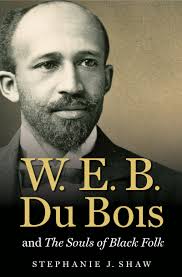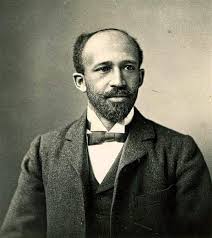The Souls of Black Folk Page #37
The Souls of Black Folk is a 1903 work of American literature by W. E. B. Du Bois. It is a seminal work in the history of sociology and a cornerstone of African-American literature. The book contains several essays on race, some of which the magazine Atlantic Monthly had previously published.
All this segregation by color is largely independent of that natural clustering by social grades common to all communities. A Negro slum may be in dangerous proximity to a white residence quarter, while it is quite common to find a white slum planted in the heart of a respectable Negro district. One thing, however, seldom occurs: the best of the whites and the best of the Negroes almost never live in anything like close proximity. It thus happens that in nearly every Southern town and city, both whites and blacks see commonly the worst of each other. This is a vast change from the situation in the past, when, through the close contact of master and house-servant in the patriarchal big house, one found the best of both races in close contact and sympathy, while at the same time the squalor and dull round of toil among the field-hands was removed from the sight and hearing of the family. One can easily see how a person who saw slavery thus from his father’s parlors, and sees freedom on the streets of a great city, fails to grasp or comprehend the whole of the new picture. On the other hand, the settled belief of the mass of the Negroes that the Southern white people do not have the black man’s best interests at heart has been intensified in later years by this continual daily contact of the better class of blacks with the worst representatives of the white race. Coming now to the economic relations of the races, we are on ground made familiar by study, much discussion, and no little philanthropic effort. And yet with all this there are many essential elements in the cooperation of Negroes and whites for work and wealth that are too readily overlooked or not thoroughly understood. The average American can easily conceive of a rich land awaiting development and filled with black laborers. To him the Southern problem is simply that of making efficient workingmen out of this material, by giving them the requisite technical skill and the help of invested capital. The problem, however, is by no means as simple as this, from the obvious fact that these workingmen have been trained for centuries as slaves. They exhibit, therefore, all the advantages and defects of such training; they are willing and good-natured, but not self-reliant, provident, or careful. If now the economic development of the South is to be pushed to the verge of exploitation, as seems probable, then we have a mass of workingmen thrown into relentless competition with the workingmen of the world, but handicapped by a training the very opposite to that of the modern self-reliant democratic laborer. What the black laborer needs is careful personal guidance, group leadership of men with hearts in their bosoms, to train them to foresight, carefulness, and honesty. Nor does it require any fine-spun theories of racial differences to prove the necessity of such group training after the brains of the race have been knocked out by two hundred and fifty years of assiduous education in submission, carelessness, and stealing. After Emancipation, it was the plain duty of some one to assume this group leadership and training of the Negro laborer. I will not stop here to inquire whose duty it was—whether that of the white ex-master who had profited by unpaid toil, or the Northern philanthropist whose persistence brought on the crisis, or the National Government whose edict freed the bondmen; I will not stop to ask whose duty it was, but I insist it was the duty of some one to see that these workingmen were not left alone and unguided, without capital, without land, without skill, without economic organization, without even the bald protection of law, order, and decency,—left in a great land, not to settle down to slow and careful internal development, but destined to be thrown almost immediately into relentless and sharp competition with the best of modern workingmen under an economic system where every participant is fighting for himself, and too often utterly regardless of the rights or welfare of his neighbor. For we must never forget that the economic system of the South to-day which has succeeded the old regime is not the same system as that of the old industrial North, of England, or of France, with their trade-unions, their restrictive laws, their written and unwritten commercial customs, and their long experience. It is, rather, a copy of that England of the early nineteenth century, before the factory acts,—the England that wrung pity from thinkers and fired the wrath of Carlyle. The rod of empire that passed from the hands of Southern gentlemen in 1865, partly by force, partly by their own petulance, has never returned to them. Rather it has passed to those men who have come to take charge of the industrial exploitation of the New South,—the sons of poor whites fired with a new thirst for wealth and power, thrifty and avaricious Yankees, and unscrupulous immigrants. Into the hands of these men the Southern laborers, white and black, have fallen; and this to their sorrow. For the laborers as such, there is in these new captains of industry neither love nor hate, neither sympathy nor romance; it is a cold question of dollars and dividends. Under such a system all labor is bound to suffer. Even the white laborers are not yet intelligent, thrifty, and well trained enough to maintain themselves against the powerful inroads of organized capital. The results among them, even, are long hours of toil, low wages, child labor, and lack of protection against usury and cheating. But among the black laborers all this is aggravated, first, by a race prejudice which varies from a doubt and distrust among the best element of whites to a frenzied hatred among the worst; and, secondly, it is aggravated, as I have said before, by the wretched economic heritage of the freedmen from slavery. With this training it is difficult for the freedman to learn to grasp the opportunities already opened to him, and the new opportunities are seldom given him, but go by favor to the whites. Left by the best elements of the South with little protection or oversight, he has been made in law and custom the victim of the worst and most unscrupulous men in each community. The crop-lien system which is depopulating the fields of the South is not simply the result of shiftlessness on the part of Negroes, but is also the result of cunningly devised laws as to mortgages, liens, and misdemeanors, which can be made by conscienceless men to entrap and snare the unwary until escape is impossible, further toil a farce, and protest a crime. I have seen, in the Black Belt of Georgia, an ignorant, honest Negro buy and pay for a farm in installments three separate times, and then in the face of law and decency the enterprising American who sold it to him pocketed the money and deed and left the black man landless, to labor on his own land at thirty cents a day. I have seen a black farmer fall in debt to a white storekeeper, and that storekeeper go to his farm and strip it of every single marketable article,—mules, ploughs, stored crops, tools, furniture, bedding, clocks, looking-glass,—and all this without a sheriff or officer, in the face of the law for homestead exemptions, and without rendering to a single responsible person any account or reckoning. And such proceedings can happen, and will happen, in any community where a class of ignorant toilers are placed by custom and race-prejudice beyond the pale of sympathy and race-brotherhood. So long as the best elements of a community do not feel in duty bound to protect and train and care for the weaker members of their group, they leave them to be preyed upon by these swindlers and rascals.
Translation
Translate and read this book in other languages:
Select another language:
- - Select -
- 简体中文 (Chinese - Simplified)
- 繁體中文 (Chinese - Traditional)
- Español (Spanish)
- Esperanto (Esperanto)
- 日本語 (Japanese)
- Português (Portuguese)
- Deutsch (German)
- العربية (Arabic)
- Français (French)
- Русский (Russian)
- ಕನ್ನಡ (Kannada)
- 한국어 (Korean)
- עברית (Hebrew)
- Gaeilge (Irish)
- Українська (Ukrainian)
- اردو (Urdu)
- Magyar (Hungarian)
- मानक हिन्दी (Hindi)
- Indonesia (Indonesian)
- Italiano (Italian)
- தமிழ் (Tamil)
- Türkçe (Turkish)
- తెలుగు (Telugu)
- ภาษาไทย (Thai)
- Tiếng Việt (Vietnamese)
- Čeština (Czech)
- Polski (Polish)
- Bahasa Indonesia (Indonesian)
- Românește (Romanian)
- Nederlands (Dutch)
- Ελληνικά (Greek)
- Latinum (Latin)
- Svenska (Swedish)
- Dansk (Danish)
- Suomi (Finnish)
- فارسی (Persian)
- ייִדיש (Yiddish)
- հայերեն (Armenian)
- Norsk (Norwegian)
- English (English)
Citation
Use the citation below to add this book to your bibliography:
Style:MLAChicagoAPA
"The Souls of Black Folk Books." Literature.com. STANDS4 LLC, 2025. Web. 11 Jan. 2025. <https://www.literature.com/book/the_souls_of_black_folk_310>.




Discuss this The Souls of Black Folk book with the community:
Report Comment
We're doing our best to make sure our content is useful, accurate and safe.
If by any chance you spot an inappropriate comment while navigating through our website please use this form to let us know, and we'll take care of it shortly.
Attachment
You need to be logged in to favorite.
Log In